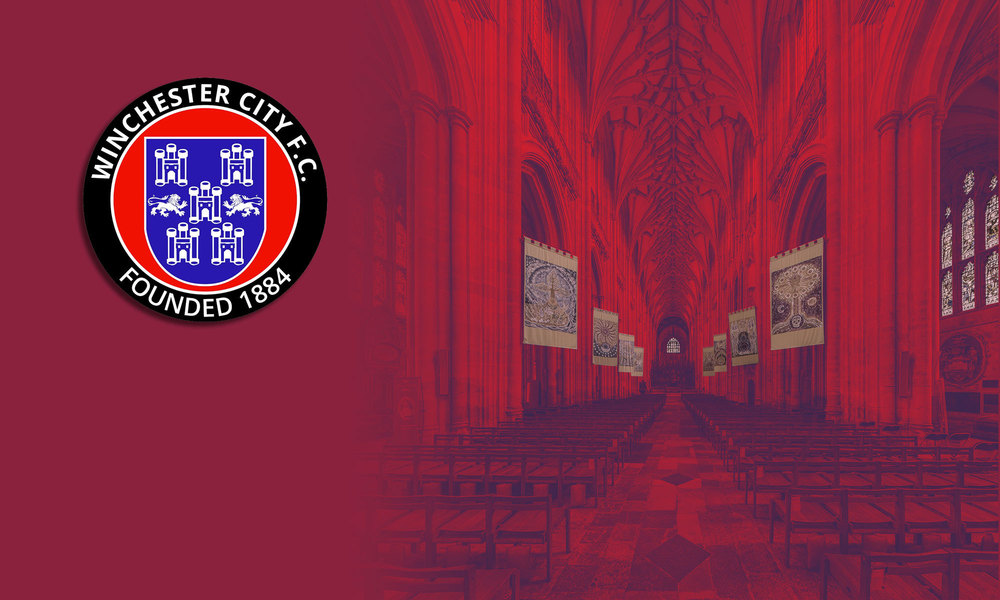
Two famous names who began their footballing careers with the club are Ted Drake of Arsenal and England and Terry Paine of Southampton and England.
Hampshire League football came to Winchester City in 1989/99, but they lasted just two seasons.
Five years later, City were back in the county set-up when it was split into the north, south and west divisions.
In 1904/05, City won their first major trophy, the North Division championship.
They remained in the North Division until 1919/20, when a runners-up place secured promotion to the County Division.
The 1928/29 season saw regionalisation again, with City winning the North Division title. They went on to won the then-Championship Shield, beating Cowes Sports, who were Southern Division champions in 1926/27 and 1927/28, 2-1 at Newport on the Isle of Wight.
Winchester were Hampshire League Division One runners-up to Newport in 1929/30 but had to wait until 1949/50 to repeat the feat.
Mid-table obscurity then followed until 1956/57 when City were relegated to Division Two, but they bounced back as champions the next season, but the respite was brief.
Periods followed in Division Two and even Division Three until in 1970/71, they finished as runners-up to Basingstoke Town and were elected to the Southern League.
That elevation in status lasted just two seasons, with City returning to the Hampshire League Division Two. In 1973/74, Winchester won that title, but two seasons later, a slide began which saw City in Division Three.
Resurgence, however, was not far away, and following 1991/92, when Winchester won the Division Three title, they regained their Division One place.
The continuing existence of Winchester City FC throughout the 1980 and 90s owed much to the work of Geoff Cox, who at various times acted as chairman, manager, coach and groundsman at the club.
Under his guidance, the club was eventually to return to the Hampshire League’s top division in 1993/94.
The new millennium ushered in a period of unprecedented success for Winchester.
Prompted in part by the arrival of new and ambitious members to the Board, the club merged with Winchester Castle and began a rapid rise through the local league structure.
Promotion to the Hampshire Premier League was achieved in 2000/01 and followed two years later by promotion to the Wessex League, where the title was secured at the first attempt.
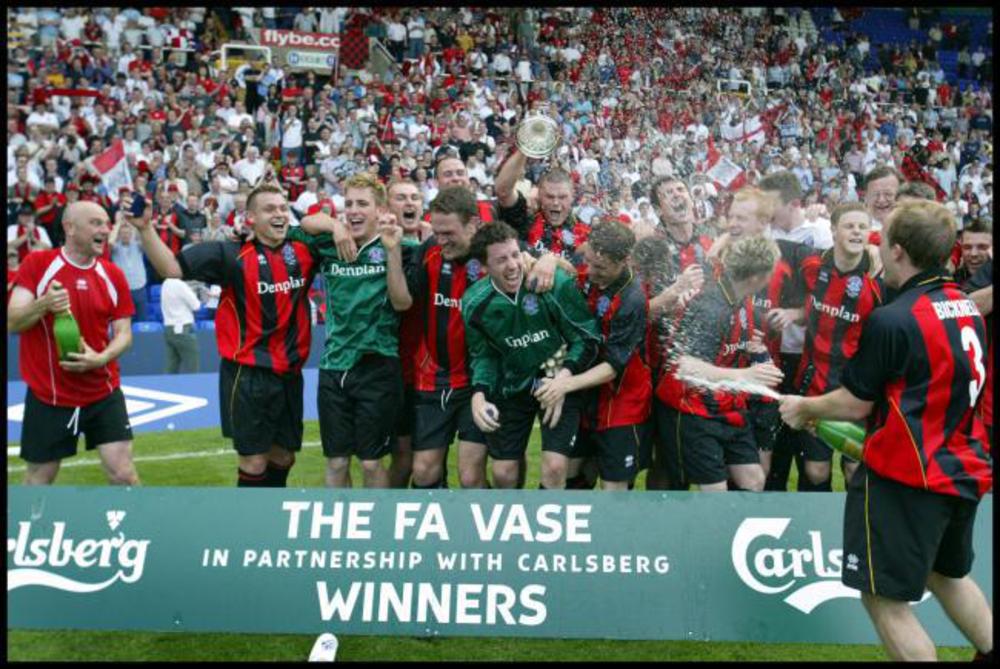
FA Vase winners
That same season witnessed the club’s greatest ever triumph. May 2004 saw City face Suffolk side AFC Sudbury in the final of FA Vase at Birmingham City’s St Andrew’s ground.
Few City fans that were there will forget the moment when club captain Danny Smith lifted the trophy after the 2-0 victory.
Further successes were recorded in the seasons that followed – 2004/05 saw City win the Hampshire Senior Cup for the second time, beating Aldershot Town 2-1 at AFC Bournemouth’s Dean Court ground, whilst 2005/06 witnessed the club regain the Wessex League championship and promotion to the Southern League for a second spell.
City’s first spell in the Southern League lasted only two seasons – and the return lasted only one more as financial problems followed by a final day points deduction saw them return to the Wessex League for the 2009/10 campaign.
Despite a concerted push to gain promotion back to the Southern League which ultimately proved successful in 2011/12, the resources required to sustain the club’s position at that level proved elusive.
City finished the 2012/13 season at the foot of the Southern League and facing an uncertain future.
The late spring of 2013 saw a takeover at the club and, with a new committee structure and financial backers in place, the 2013/14 season heralded the start of a new chapter in the history of Winchester City FC.
Season 2013/14 saw a season of re-organisation and team building, with City retaining a place in the Wessex League.
In 2014/15, City made a valiant attempt to take the Wessex title but just fell short to a very successful Petersfield Town side who were promoted to the Southern League.
City, now under the managership of Paul Masters, then set about strengthening the squad to win the title next season when out of the blue they were offered a place in the Southern League due to a withdrawal.
The club were given 24 hours to pay their fees and attend the AGM in Torquay. A frantic drive by the director of football Dave Malone saw him arrive just in time with the relevant papers and bank draft!
As a result, neighbours Petersfield were moved out of Division One South & West to accommodate City and placed in the Central Division!
City's first season back in the Southern League was a success. They reached the play-offs, losing to Banbury United in the quarter-finals – Banbury eventually going up after beating Taunton Town in the final.
City also came within minutes of winning the Hampshire Senior Cup, losing on penalties to Havant & Waterlooville.
The City preparation for the 2016/17 season was disrupted by the unexpected resignation of manager Paul Masters in the middle of pre-season friendlies.
But the club quickly filled the vacancy by appointing Petersfield's Ian Saunders to the post.
The club started the season brightly and made it to the Fourth Qualifying Round of the FA Cup, beating US Portsmouth, Street and Truro City before finally succumbing to Harrow Borough.
Saunders went away on duty with the forces and during this time, Mick Catlin stepped in to take over the running of the team.

Craig Davis
When Saunders returned, form deteriorated and he subsequently left the club in March 2017 and was replaced by interim manager, Craig Davis, who had joined the club as a player from Fleet Town.
Davis took control of the club until the end of the season 2016/17, when it was announced that he would officially be becoming the permanent manager.
Davis came to City from Fleet after relinquishing his position as player-manager at Calthorpe Park.
His playing career started off as a professional at Cardiff City before spells at Bashley, Salisbury City, Gosport Borough and AFC Totton.
He has won both the Southern League South & West and Premier as a player.
As mentioned earlier, Winchester`s most famous former players are Ted Drake and Terry Paine.
Drake started playing at Winchester whilst continuing to work as a gas meter reader.
He nearly joined Tottenham Hotspur as a schoolboy but missed the trial match as he suffered an injury playing for Winchester.
In June 1931, George Kay persuaded him to join Southampton, then playing in Division Two.
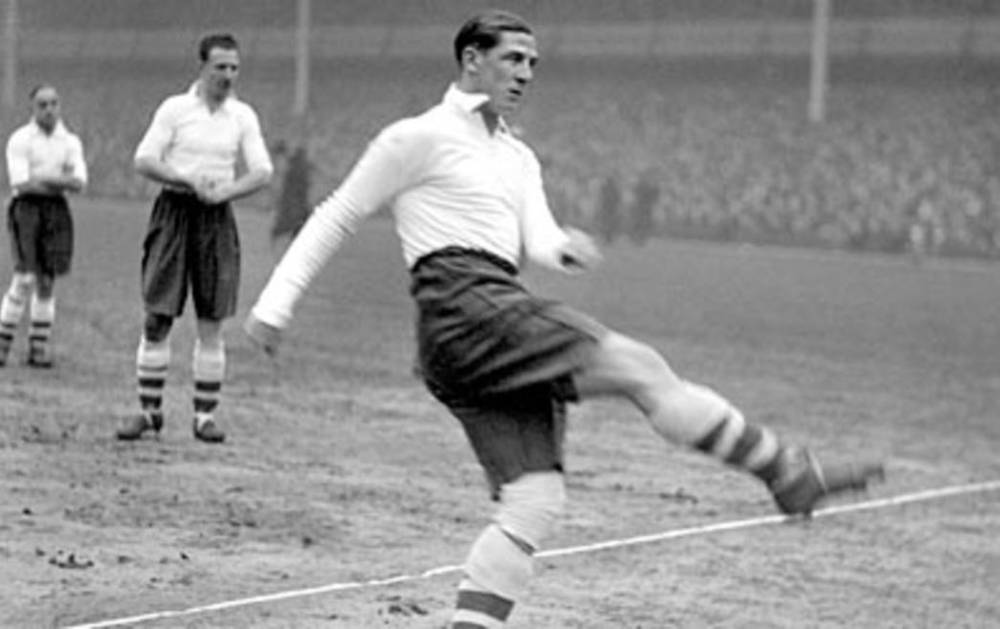
Ted Drake
He made 71 appearances for the Saints and scored 47 goals but really made his name playing for Arsenal in the 1930s, winning two league titles and an FA Cup, scored 124 goals in 167 games for the Gunners and won five caps for England at a time when there were a plethora of good centre-forwards on the scene.
He was also a good cricketer, but only ever played sparingly for Hampshire.
After retiring from playing after losing six years to the Second World War, he became a manager in 1946, firstly with then-Athenian League side Hendon.
He enjoyed a fruitful spell at Reading from 1947 until 1952 before taking over at Chelsea where, in 1954/55, he led the Blues to their only First Division triumph of the 20th Century. That achievement made him the first player to win the championship as a player and as a manager.
Drake died in 1995, aged 82.
Paine was born in Winchester and joined Southampton from City in February 1957 where he became one of the finest wingers in the country.
In the following 14 years with the Saints, he went on to make 713 League appearances, scoring 160 goals.
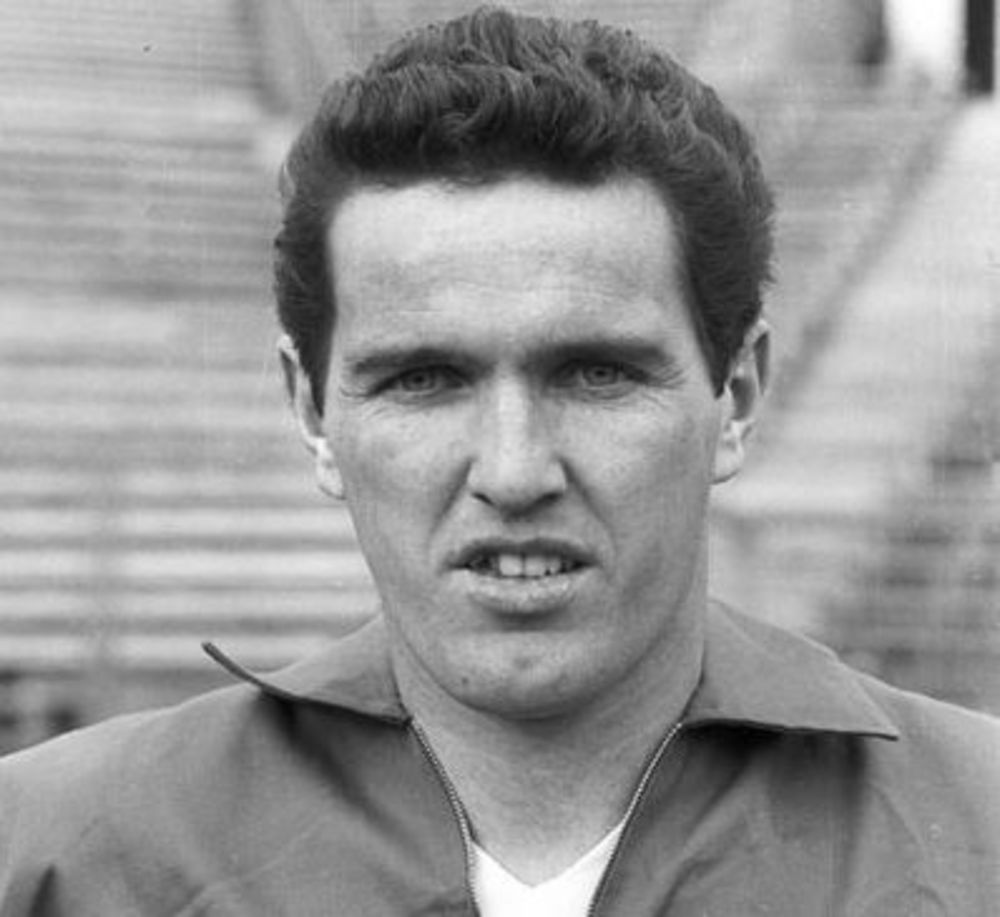
Terry Paine
He collected a Third Division championship medal in the 1959/60 season with Southampton, prior to gaining the first of his 19 full international caps three years later, having already gained 4 caps for the England under-23 side, as well as representing Young England and the Football League XI.
His 7 goals for England included a hat-trick against Northern Ireland in 1963 in the first-ever game to be played under floodlights at Wembley Stadium. Jimmy Greaves scored the other four goals in an 8-3 victory for England
Paine was a key member of the Saints side that gained promotion from the Third Division, right through to the elite for the first time in their history in the 1965/66 season.
He was selected for the World Cup squad in 1966 and played in the opening matches but lost his place when Alf Ramsey chose to play without wingers.
After eventually leaving Southampton in 1974, Paine signed for Hereford United, not long a Football League side then, of course.
He proved to be a big influence on the Hereford side after joining as player-coach in July 1974 and his tactical and coaching ability soon guided the Bulls to the Third Division championship in the 1975/76 season.
He went on to break the highest number of Football League appearances record whilst at Edgar Street, eventually hanging up his boots after a total of 824 matches.
It was towards the end of his time with Hereford that, in 1977, Paine was made an MBE in the New Year’s Honours list in recognition of his service to the game of football.
Terry later played and briefly managed in the Southern League with Cheltenham Town whilst a publican at the White Horse Inn, near Stroud and later had a spell managing in Kuwait, before coaching in South Africa.
In 1989 he teamed up with his former Hereford boss John Sillett at Coventry City as reserve team coach but returned to South Africa where he presents their equivalent of Match of the Day on television.
Winchester had another international wear their colours – albeit an England Amateur international in Derek Gamblin.
Primarily a right-back, Gamblin turned out for Sutton United in the Athenian and then Isthmian Leagues.
He also made one Football League appearance for Portsmouth as a youngster and still as an amateur during the 1965/66 season.
He returned to Sutton and also spent time with Hendon, Slough Town, and Leatherhead before joining Winchester in 1970.
He moved to Isthmian League Wycombe Wanderers in 1971 and went on to make 72 appearances during a two-year spell under manager Brian Lee.
He won a total of 29 England Amateur international caps and was also a member of the Great Britain side that missed out on qualifying for the 1972 Olympics.
After retiring from playing, he worked in the family business, Meon Valley Nurseries, and also turned out for the Pompey ex-Pros XI.
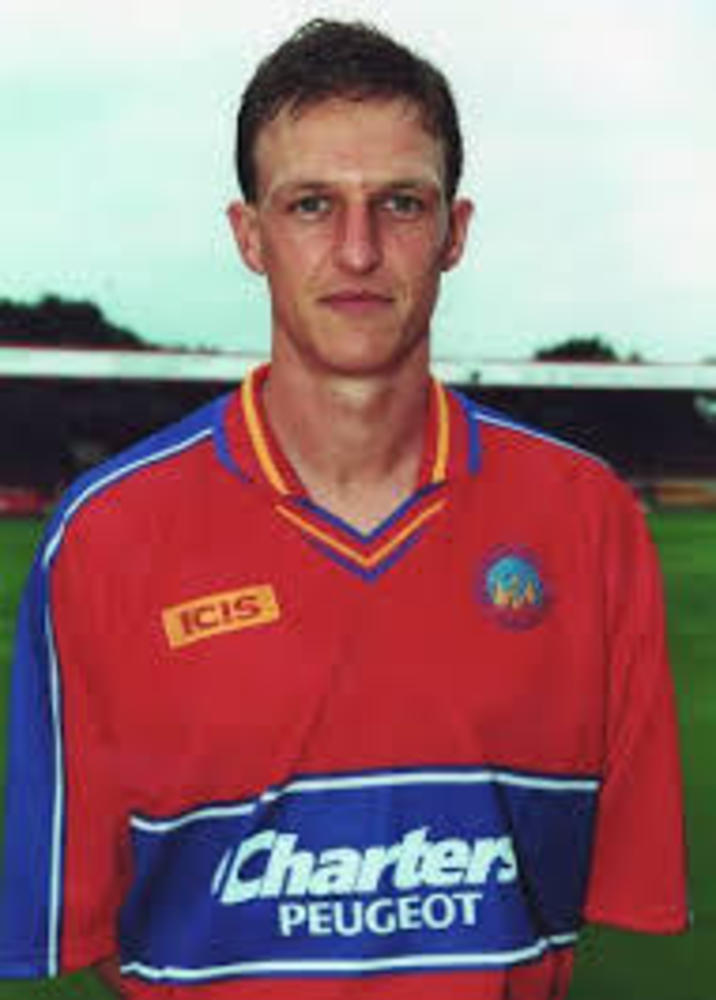
Mark Blake
Portsmouth-born defender Mark Blake came through the ranks at Southampton.
With hardly a regular defender available for the last game of the 1985/86 season, the England Youth international was given his debut at centre-back.
With Mark Wright still not recovered from breaking his leg in the 1986 FA Cup semi-final, Blake kept his place at the start of the next season but returned to the reserves after the side suffered a hammering at Manchester United and would never again have as long a run of games for the club.
He still had plenty of League football left to play, though, in 140-odd appearances for Shrewsbury Town and as many again at Fulham, initially for Ian Branfoot and then as a regular – and penalty-king – in Micky Adams’s 1997 promotion-winning side.
He then had a couple of adventures overseas, beginning with a short-lived stay in China.
Former team-mate Paul Rideout recommended Blake to Chongqing but after completing the pre-season games, his contract, along with those of his fellow-imports, was severed after the club lost its backer and would be unable to pay the attractive salaries, they had promised their overseas players.
He returned to play for Aldershot Town in the Isthmian League on 2000 and to start working in IT.
He then joined Winchester, firstly as a player, then-player-coach and eventually player/assistant-manager.
He enjoyed remarkable success with City as number two to Neil Hards, helping them to the `treble` of FA Vase, Wessex League and Wessex League Cup in 2004.
But in January 2005, Blake left City to join ambitious Isthmian Premier neighbours Eastleigh as a coach to former Southampton team-mate Nick Banger.
But in the close season of 2006, he quit due to the pressures of becoming an IT full-time sales director, operating across the south-east from his Southampton home.
In 2019 he had his own IT company specializing in the financial sector.
Winger Billy Bevis signed for Portsmouth as an amateur at the age of 15 after he had trialled at Norwich City who were then managed by Tom Parker.
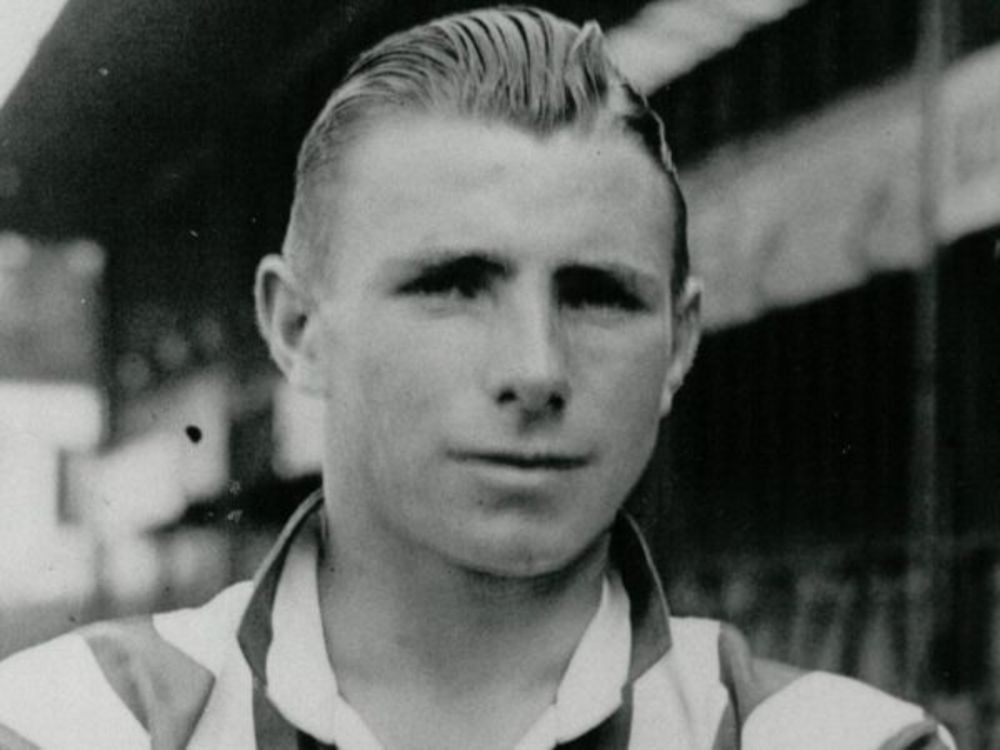
Billy Bevis
When Parker became Southampton’s new manager, he remembered the young Hampshire lad and signed him professionally in June 1936.
His pairing with Ted Bates (another young import from Norwich) in the 1937/38 season immediately caught the eye.
Bates featured less often the following season, but they enjoyed a late run in tandem, during which Bevis scored a hat-trick at Swansea Town in April 1939.
By then, Newcastle had made inquiries, but the Second World War scuppered any chances of a move.
Joining the Merchant Navy as a petty officer gunner, he had an eventful time, being torpedoed three times, mined once to spend seven days adrift at sea.
He was rescued from a raft by a destroyer whose crew coincidentally included a former team-mate, reserve goalkeeper, Alec Warnock.
His escapades earned him the DSM which was presented to him by King George VI at Buckingham Palace in 1944.
After being demobbed in November 1945, he returned to The Dell for a few games in the transitional 1945/46 season but, after a further 14 games the following year he decided to retire from League football, despite tempting offers from Plymouth Argyle and Brighton & Hove Albion.
He signed for Winchester in 1947 and spent two years with the club in the Hampshire League before spending two seasons with rivals Cowes Sports in the Isle of Wight.
He returned to Winchester in 1952 at the age of 35 and then finished off his career with home-town Hampshire League outfit Warsash.
Lymington-born Martin Thomas began his career as a trainee with Southampton, earning a full contract in June 1992.
However, he had to wait until joining Leyton Orient in March 1994 to make his Football League debut.
From there he featured in promotion-winning sides with both Fulham and Swansea City and was signed by Exeter City on a free transfer from Oxford United in May 2002.
Thomas was offered another two-year contract by a cash-strapped then-Conference outfit Exeter, but it was on reduced terms.
So, instead, he opted to return to his Southampton roots and combine part-time football with a day job and in July 2004 signed for then-Isthmian Premier outfit Eastleigh.
He helped the Spitfires to promotion to the Conference South before leaving midway through the 2006/07 season to join Winchester.
His stay at City was a brief one, however, and he went on to sign for neighbours AFC Totton in June 2007 where he ended his playing days.
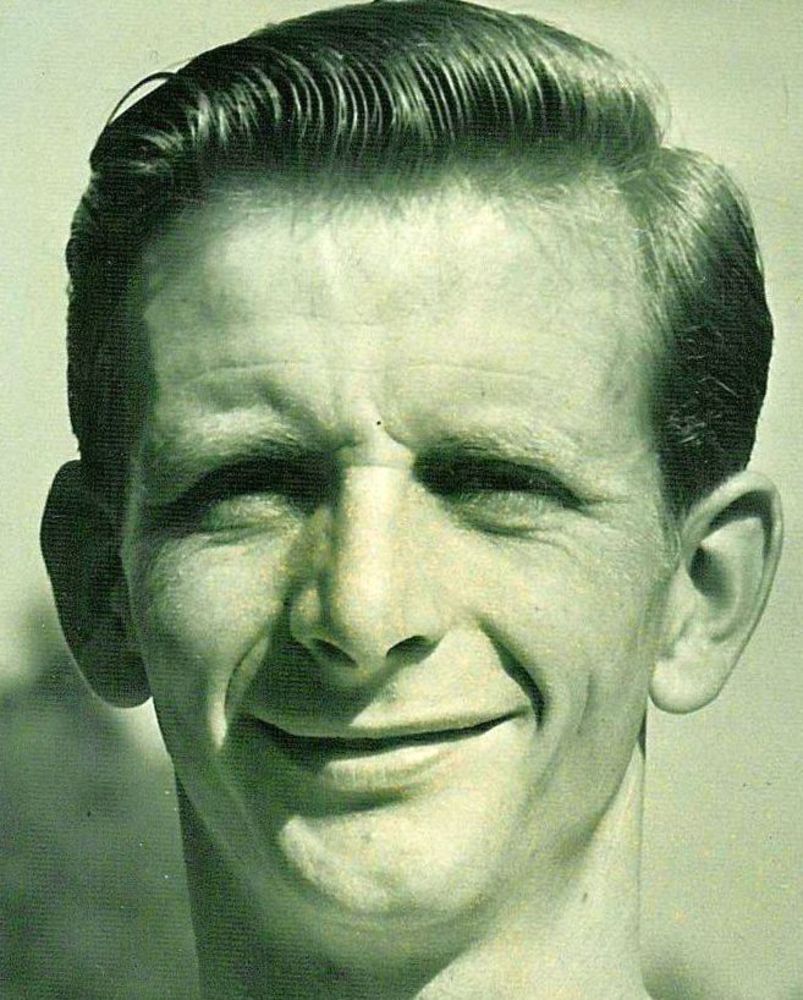
Bernard Harrison
Outside right Bernard Harrison was a natural sportsman, once described as being “perhaps too talented for his own good.”
He started his career with Portsmouth but was unsuccessful in getting a spot in the first team, with two years on National Service not helping his progress and a certain Terry Paine`s consistency blocking his way.
But his career took off once he joined Third Division South side Crystal Palace in 1955.
Also, at this time turning out for Hampshire`s 2nd XI at cricket, he made over 100 appearances for Palace, scoring 12 goals, before returning to The Dell in 1959.
He played 3 games in the 1959/60 promotion-winning season – with Paine switching to inside right– and although many fans thought this was the perfect solution, Harrison was released and transferred to Exeter City in 1960.
He played 18 games for the Grecians, scoring 4 goals before leaving St James’ Park in the summer of 1961 for Southern League Division One side Poole Town.
He then played for Western League side Dorchester Town and Andover, Hampshire Leaguers Portals Athletic and finally their league rivals Winchester in 1968, where he ended his playing career.
A qualified teacher, he was working at Farleigh School, Basingstoke from 1982, and then at another school near Andover.
He died in March 2006 at the age of 71.
A central defender, Winchester-bornLeigh Mills joined Tottenham Hotspur as a first-year scholar in July 2004.
He was previously on the books of Swindon Town and he represented Hampshire at under-15 and under-16 level, captaining the England under-16 side, but he had not made a first team appearance for the Wiltshire club.
He has been capped for his country at under-17 level and went straight into the Spurs under-18 side.

Leigh Mills
Mills maintained a steady development through the youth sides and in 2006/07, he broke into the reserves and played regularly, showing good composure and skill in impressing youth coach Clive Allen.
In May 2008, he signed a new professional contract with Spurs and went out on loan at the start of the 2008/09 season with Brentford, but this was quickly cancelled and he spent a loan spell at Gillingham, where he impressed from the start of the season, but returned to Tottenham in December.
A month later, the club announced that his registration had been cancelled.
Had been on trial at Aldershot Town but was not taken on at the Recreation Ground.
Eventually got a contract with his home-town club, Winchester, where he played for two years in the Wessex League and then, briefly, the Southern League.
He left City for Eastleigh but departed the Spitfires and just five months in February 2013, when the club decided to go full-time.
Blackfield & Langley was Mills' next club, where he won a Wessex League championship medal - his second after obtaining the other with Winchester.
He then re-joined Winchester in 2013, now back in the Wessex League, before he decided to take a break from the game in October 2014 to concentrate on his job at the Wellington Academy in Ludgershall as a sports teacher.
Doug Hunt started his playing days in the Hampshire League with Winchester.
Indeed, at Winchester, he took over the number 9 shirt from Ted Drake when he left for Southampton in 1931.
Hunt played as an amateur for Southampton, before being taken to the Tottenham Hotspur nursery team at Northfleet in the Southern League and then brought through to the first team at White Hart Lane in 1934.
He found a regular place in the first team difficult to hold down, as he played in the same position as George Hunt and Johnny Morrison, who were prolific scorers. Nor did it help coming into a side heading for relegation. With only 24 games under his belt, he moved on to get first team experience and signed for Barnsley, then Sheffield Wednesday until World War II broke out.
During war-time games, Hunt returned to London to play for Brentford, Fulham, Spurs, Aldershot and West Ham United, winning the London War Cup with Brentford in 1942.
He stayed in the capital after the war, signing for Leyton Orient, until he stopped playing in 1948, when he became assistant manager.
However, soon afterwards he took over as manager at Gloucester City in the summer of 1948.
Success was hard to come by but Hunt did manage to improve things gradually with the Tigers, finishing tenth and then ninth before being tempted to take over league rivals Tonbridge after a short stint as trainer and coach at Yeovil Town, in January 1954.
Although league form was nothing much to write home about either at Tonbridge, he did take them to two Southern League Cup finals in 1955 and 1957.
He also signed Ron Saunders in July 1956 starting him on the road to becoming a top player and manager with the likes of Aston Villa.
In 1958, he returned to the Yeovil coaching staff and stayed for a further 25 years until he left football in 1986.
He died in May 1989 in Yeovil.
Inside right or winger Mick Mellows was a former England Schoolboy, Youth and 15-times Amateur international.
His first club was Sutton United in the Isthmian League, signing in 1965 whilst training to be a teacher at college in Winchester.
During this time with the U`s he helped them to win the Isthmian League title in 1966/67 and played in the 1969 FA Amateur Cup Final at Wembley when Sutton lost 2-1 to North Shields.
His form for Sutton attracted League scouts and he signed for Third Division Reading in September 1970.
He made 16 appearances for the Royals, scoring 2 goals, before signing for Winchester, then in the Southern League, in 1971.
He returned to the Isthmian League with Wycombe Wanderers in 1972 and played 17 games before he asked Portsmouth for a trial in September 1973 and was immediately recruited.
He played consistently for Pompey over the next five years and won the player of the year award in 1975.
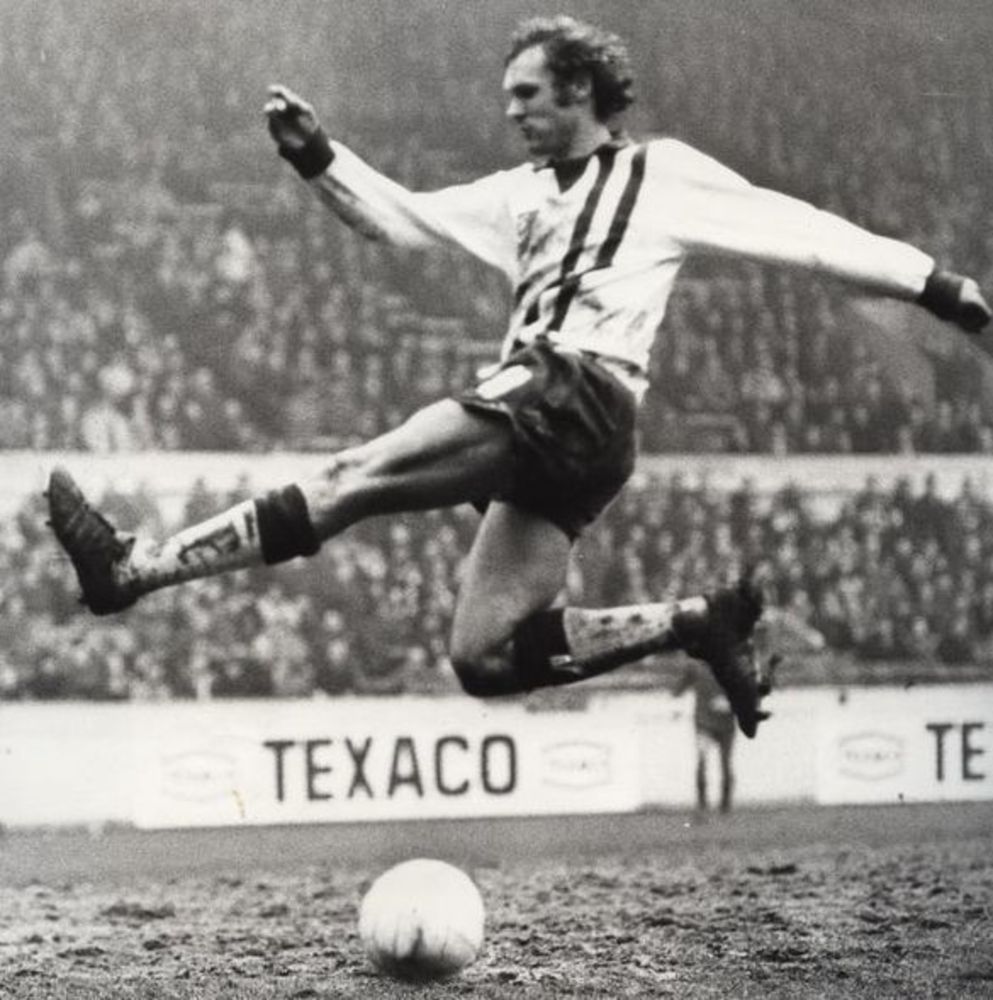
He went on to make over 200 appearances, with 16 goals before finishing his playing career back in the Southern League with Waterlooville, where he spent four years, playing more than 150 times and scoring around 35 goals.
He now lives in Portsmouth where he is now Pompey's assistant Chaplain.
A devout Christian, Mellows (pictured) also runs 'Faith and Football' with fellow ex-Portsmouth players Linvoy Primus and Darren Moore, the recently appointed manager of Sheffield Wednesday.
John Hoskins, another of the former Winchester players to spend most of his career as a winger, started his career with City in 1950.
He quickly gained a reputation as a prolific goalscorer in the Hampshire League and this brought him to the attention of his home-town club Southampton, for whom he signed as a professional in July 1952.
He made his League debut away to Blackburn Rovers five months after signing and put in a decent performance, despite a 3-0 loss.
He gained international recognition of sorts when he toured the West Indies with the FA XI in 1955 scoring 6 times in 11 appearances, some achievement as he had played most of his football in the Third Division following the Saints relegation in 1953.
He held on to the number 11 shirt until John Sydenham wrested it from him for good in 1959.
Leaving Saints for Swindon Town in 1960, he only played 10 times for them before having a short spell with Southern League side Cambridge United.
But aged only 28, he turned his back on football to drive corporation buses for a living.

Most clubs are looking for volunteers. Find out more on the button below:
www.PitchingInVolunteers.co.ukAll the news and results in one place.
REGISTER